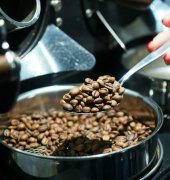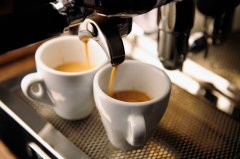The reason why tap water or mineral water is generally not used for brewing coffee.

Professional barista communication, please pay attention to coffee workshop (Weixin Official Accounts cafe_style)
About 98%~99% of a cup of coffee is water, and wine, tea, good water quality to show the aroma of coffee. Mineral water is hard water containing minerals that interfere with the release of caffeine and tannins, making coffee taste less. The most suitable for brewing coffee is boiling water boiled on a gas stove. There is also a little carbon dioxide left in this water, which can highlight the delicious taste of coffee.
Just as water is essential for brewing tea, water is essential for extracting coffee. To extract coffee, we need fresh, odor-free, moderately pH, pollution-free water.
Fresh means that the water is rich in oxygen and full of vitality. It is also recommended to start heating with cold water, it is best not to use warm water directly.
2, no odor, many poor water quality city tap water impurities are more, chlorine content is also high, which leads to a larger smell, serious impact on the taste of coffee. Baristas and coffee lovers are advised to spend more time on water treatment.
3, moderate pH is very easy to understand, the best brewing water is pH 7 neutral water, not acidic, not alkaline.
No pollution is also extremely important, in other words, the water quality should be pure. However, it is necessary to pay attention to "too much", too pure, and the extracted coffee liquid tastes strong and strong, thin and rigid, rich and layered. Some coffee friends mix pure water and tap water (no odor and no pollution) according to the ratio of 10:1, which is said to be very good.
In addition, whether to use soft or hard water for extracting coffee has always been controversial. Personally feel that too hard or too soft water to brew coffee is not good, the water is best to be moderately hard, and preferably low in minerals.
It should be noted that if you use a coffee machine to make coffee, in order to avoid the accumulation of sediment in hard water with hardness of 300mg/L and block the pipeline, it is necessary to soften it (you need to buy water purification and soft water equipment), especially for friends who are engaged in operating Espresso coffee machines.
Important Notice :
前街咖啡 FrontStreet Coffee has moved to new addredd:
FrontStreet Coffee Address: 315,Donghua East Road,GuangZhou
Tel:020 38364473
- Prev

Baking tips: how to easily screen residual beans
I saw on the Internet yesterday that someone asked if the vibrating screen could screen peanuts and coffee beans, and the answer was yes. In the following, some problems and solutions of vibrating screen in screening these two materials are discussed. First of all, customers need to know the number of peanuts and coffee beans, and then choose the appropriate sieve, which is like screening peanut and coffee beans. Its
- Next

Evaluate the standard of espresso and the skills of making espresso
Professional baristas Please follow the coffee workshop (Wechat official account cafe_style) We often hear customers complain that the coffee is too cold in the coffee shop. Customers walk into the coffee shop to experience the charm of the third wave of coffee and expect professional baristas to make them a cup of warm, fragrant coffee, but why do they have the idea that the coffee is too cold?
Related
- Beginners will see the "Coffee pull flower" guide!
- What is the difference between ice blog purified milk and ordinary milk coffee?
- Why is the Philippines the largest producer of crops in Liberia?
- For coffee extraction, should the fine powder be retained?
- How does extracted espresso fill pressed powder? How much strength does it take to press the powder?
- How to make jasmine cold extract coffee? Is the jasmine + latte good?
- Will this little toy really make the coffee taste better? How does Lily Drip affect coffee extraction?
- Will the action of slapping the filter cup also affect coffee extraction?
- What's the difference between powder-to-water ratio and powder-to-liquid ratio?
- What is the Ethiopian local species? What does it have to do with Heirloom native species?

